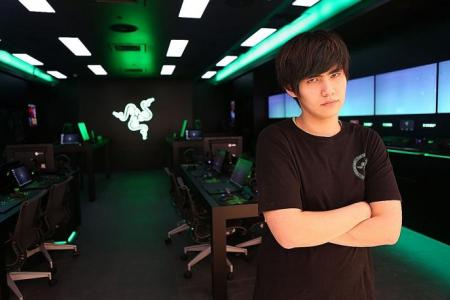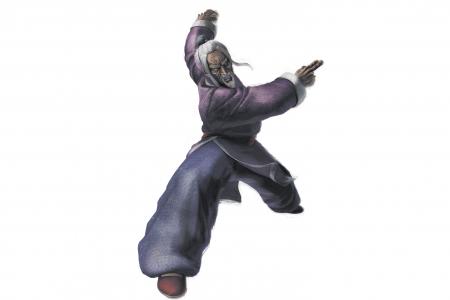Confessions of a professional gamer
Playing video games for a living might seem like a dream come true for some.
But it is real life for Mr Ho Kun Xian, who is one of the top Street Fighter players in the world.
Since 2011, the Singaporean, better known as Xian in the gaming community, has been placed in the top 10 in more than 60 international competitions.
He remains unaffected by his celebrity status, though. Peeking through his long fringe, the soft-spoken 25-year-old says: "I don't have many fans here. Not as many as overseas where some of them can get really crazy."
How crazy?
He recalls an incident two months ago at Dreamhack 2015, a competitive gaming festival in Jonkoping, Sweden.
A large-sized man took off his shirt and asked Mr Ho to sign his chest with a black marker. Stunned, Mr Ho had no choice but to comply.
"I had to! He... was standing there in front of me, blocking my way," he says.
Not everyone he encounters is supportive.
Mr Ho recalls a man he met in Seattle in 2012 who asked him for an autograph in a black notebook as he was walking out of a competition venue.
As soon as he signed it, the man shut the book and ran away, not before telling him that he "was going to die" because he had just signed a "death book".
He admits: "That freaked me out. I was a bit scared after that."
The silver lining is that Mr Ho is never in trouble with his girlfriend over his avid fans.
"None of them have wanted to follow me back to my room (when I am) overseas," he says with a grin.
"Besides, most of them are guys anyway."
Growing up, Mr Ho said his family did not have enough money to own a home and moved from one rental flat to the next.
To support himself, he started doing odd jobs after finishing secondary school. He has worked as a cargo lifter, home mover and hawker centre stall assistant.
He says: "I did all those jobs to occupy my time, but I was never satisfied with what I did.
"Not until I played Street Fighter IV."
He discovered the game in 2009 at an arcade. While he had played fighting games in the past, the stellar graphics and intuitive controls were new to him.
He says: "After playing it for the first time, I was so amazed. I knew I wanted to be the best at this game."
Using the little savings he had, he bought a PlayStation 3, the console that Street Fighter is played on at international competitions.
Since his home didn't have a TV that could be used for gaming, he kept the console at a friend's apartment and would spend almost eight hours a day there playing intensively.
After training for a few months, Mr Ho joined his first local competition that same year. He managed to get first place and represented Singapore at Dreamhack 2009.
Although he lost badly, it was his first taste of the competitive gaming world, and he was hooked. For the first time in his life, he felt a sense of direction.
"A lot of people I knew from my past were getting caught up in gangsterism. Street Fighter gave me a focus," he says.
As for the most interesting thing about gaming, he says: "Not only must you know your characters, you must also know how to read and anticipate opponents. No match is the same, and I like the challenge."
He got a job managing a gaming cafe in Selegie Road and spent most of his time working or training, determined to improve his skills.
His professional career took off in 2011. After his friend agreed to cover his expenses, he flew to Las Vegas to take part in the international Evolution Championship Series (Evo) for Super Street Fighter IV, in which more than 2,000 people compete annually. He finished in the top 20.
Two years later, at Evo 2013, he won the top prize of US$5,800 (S$8,270).
SPONSORSHIP
Shortly after, Mr Ho was offered a sponsorship from local gaming equipment manufacturer Razer. It now funds his expenses when he goes abroad to compete.
He has been blazing through Street Fighter tournaments worldwide, catching the attention of international media and getting invited to attend various gaming events.
According to an online e-sports earnings listing, Mr Ho earned almost $37,000 from winning competitions last year.
Every week, he spends two hours streaming a video feed of himself playing Street Fighter and teaching viewers how to play the game.
"Street Fighter helped turn my life around, and I hope to inspire other people to chase their dreams too," he says.
Like the matches that he plays, Mr Ho acknowledges that there is a time limit to his career.
"I know that I cannot do this forever, but I'll keep on trying my best to win as much as I can."
SECRETS OF THE TRADE
1. Competitive gaming is like any other sport. You need to study how your opponents play, be it by watching a video of them playing or taking notes on their playing styles at competitions.
2. Hand warmers are important in cold countries. The last thing you want is for your reaction time to be affected when you are competing.
3. Games like Street Fighter get updated often. Keep up to date with what is going on with the developers and be prepared to learn (or unlearn) techniques for your characters.
Get The New Paper on your phone with the free TNP app. Download from the Apple App Store or Google Play Store now




